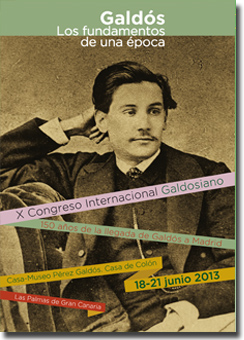GALDÓS Y EL REGENERACIONISMO A TRAVÉS DE LA CORRESPONDENCIA CON RAMÓN PÉREZ DE AYALA (1905-1918) / GALDÓS AND THE REGENERATIONISM FROM THE COLLECTED LETTERS INTERCHANGED WITH RAMÓN PÉREZ DE AYALA (1905-1918)
Palabras clave:
Benito Pérez Galdós, Regeneracionismo, Ramón Pérez de Ayala, epistolario, narrativa siglo XIX, Regenerationism, epistolary, Nineteenth Century LiteratureResumen
En esta ponencia se muestra la información que emana de la correspondencia intercambiada por Benito Pérez Galdós y Ramón Pérez de Ayala entre 1905 y 1918. Además de dejar atestiguada la amistad que se estableció entre ambos, a través de esta correspondencia se puede apreciar el talento de Galdós para escuchar los latidos de la sociedad, así como su pulso activo para intentar cambiarla a través de su mejor aliada: la pluma. En estas misivas se trasluce el carácter regeneracionista que comparten Pérez de Ayala y Pérez Galdós, pues a pesar de su diferencia de edad ambos miran con desconsuelo la circunstancia española y comparten el deseo de actuar contra la parálisis nacional. Igualmente, podemos rastrear en ellas la proyección de don Benito gracias a las reseñas críticas publicadas en los periódicos por Pérez de Ayala, a pesar de la politización de los estrenos de sus obras, hecho que también se refleja en esta correspondencia.
In this lecture we will show information from the collected letters interchanged by Benito Pérez Galdós and Ramón Pérez de Ayala among the years 1905 and 1918. In this correspondence, besides testifying the friendship established between them, it is possible to perceive Galdós’ talent to listen to the beats of society, and also his active pulse trying to change it through his best ally: his quill. These missives reveal the regenerative spirit that Pérez de Ayala and Pérez Galdós shared, because in spite of the age difference they look at the Spanish situation grievously, sharing a desire to act against the national paralysis. Also, we can trace through them Don Benito impact, thanks to the critical reviews in newspapers by Pérez de Ayala, in spite of the politicization of his works premieres, fact that it is also reflected on this correspondence.




